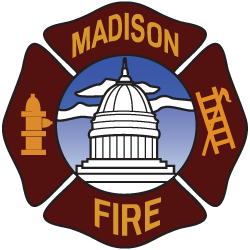Several Properties Damaged From Burst Pipes and Water Leaks
Madison Fire Issues Reminders About Renters Insurance, Protecting Pipes
Recent weather events resulting in extremely cold temperatures and wind chills, followed by a warming temperatures, are leading to the discovery of burst pipes and water leaks across Madison. Over the past several days, the Madison Fire Department responded to at least 30 incidents involving significant leaks in homes, hotels, schools, and businesses.
Pipe bursts and breaks typically occur when water inside the pipe freezes, putting too much pressure on the pipe or joints. The problem is usually discovered only after the ice begins to thaw. As outdoor temperatures began to warm over the weekend, the 911 calls for service related to water leaks increased.
Incidents like these can cause significant damage and render one’s home uninhabitable for an extended period of time while cleanup and restoration efforts take place. The cost of replacing damaged possessions and finding alternate housing often falls on occupants to pay out of pocket if they are not insured.
While business and home owners typically carry insurance, the Madison Fire Department responded to several incidents where renters did not have insurance. Renters insurance can be a safety net for tenants when the unexpected occurs. It offers protection for the loss of personal property in the event of fire and other disasters, and some policies may also reimburse some or all of the cost of a hotel stay. Most renters insurance plans are available for $20 per month or less.
The Madison Fire Department is encouraging renters to research and sign up for an insurance policy if they are not already enrolled in a plan. Consumers should consider the available options and choose a plan that is right for them. It’s a small investment that could make a big difference when confronted with unexpected disasters.
The Madison Fire Department also encourages owners of rental properties to talk with tenants about signing up for renters insurance. Some properties require renters insurance as a condition of the lease.
Protect Your Pipes During the Winter
To help prevent water-related emergencies like these, property owners and construction contractors are reminded to ensure all pipes, including automatic sprinkler systems, are properly insulated. Check for areas where cold air may be rushing in.
While most of the incidents this week would have been difficult for the average occupant to prevent, some may have been avoided by:
- Keeping thermostats set to a minimum of 55 degrees, even if leaving home for an extended period of time;
- Turning off the water supply and draining the pipes if leaving for an extended period of time;
- Opening cabinet doors under kitchen and bathroom sinks to allow warmer air to circulate around the pipes;
- Keeping windows and doors closed to keep out cold air;
- Replacing the batteries in your thermostat if leaving for an extended period of time. Worn out batteries may prevent the furnace from turning on when it should.
Additionally, make sure all outdoor hoses are disconnected and faucets are turned off. Keep heat ducts, cool air returns, and any heat source unobstructed.
Never use an open-flame device to try to thaw your pipes.
Call 911 if the water leak has reached electrical devices or utilities, causing an electrical hazard, or any time standing or rising water covers the pilot light or gas valve for your water heater or clothes dryer.
Contacts
- Cynthia Schuster, Public Information Officer, Madison Fire Department, (608) 261-5539, cschuster@cityofmadison.com
